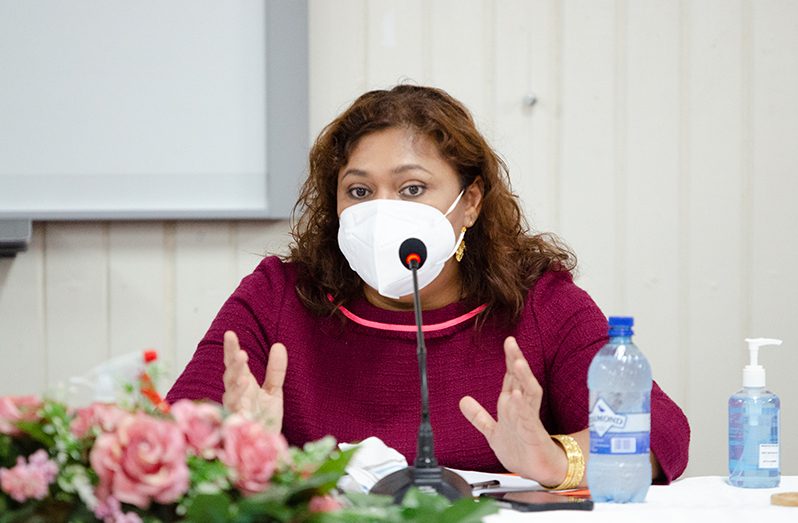– move to counter views on learning loss, lifelong damage
By Vishani Ragobeer
MORE than 20,000 students who are expected to write examinations with the Caribbean Examinations Council (CXC) and those who require facilities for technical learning will be returning to schools from November 9.
At a press conference held at the National Centre for Educational Resource Development (NCERD) on Saturday, Minister of Education, Priya Manickchand, related that schools will be reopened for face-to-face engagement for students in Grades 10 (Fourth Form), 11 (Fifth Form) and 12 (Sixth Form) from November 9. These students will be writing the Caribbean Secondary Education Certificate (CSEC) Examinations and the Caribbean Advanced Proficiency Examinations (CAPE).
Additionally, all practical instructional and technical vocational education centres will be reopened simultaneously. The various dorms which house students are being prepared and will be reopened to facilitate the students who will be returning to schools.
Due to the unusual circumstances presented by the current COVID-19 pandemic, schools have been closed for physical engagement since March. Since then, the Education Ministry has been trying to facilitate learning through the use of broadcast media, the internet and worksheets.
The Minister highlighted, “We remain sure, however, that nothing we do will match the effectiveness or the value of a teacher in front of a classroom in face-to-face engagements.”
According to the recent gazetted measures in the COVID-19 Emergency Measures (No. 11), schools have been given the ‘greenlight’ to reopen. In addition to complying with mandatory measures listed in the notice, schools will also have to comply with any guidelines or instructions issued by the Ministry; these are aimed at preventing the spread of the novel coronavirus, COVID-19.
PRECAUTIONS

On Saturday, the Education Minister said that that decision to reopen schools emerged out of extensive discussions between many stakeholders including parents, teachers, the health authorities, the Guyana Teachers’ Union (GTU) and the Caribbean Examinations Council (CXC). Additionally, she assured that the decision was also informed by statistics, global best practices and cognisance of the Guyanese reality.
To ensure that safety is assured, an assessment of schools’ readiness was done in collaboration with the GTU. Following this assessment, the Ministry has been preparing schools; this preparation encompasses installing sinks, ensuring restroom facilities are up-to-par, ensuring there is adequate ventilation, and ensuring the ability to physically distance students.
Minister Manickchand emphasised that there will be regular temperature checks, frequent sanitisation and the provision of supplies such as masks and sanitisers for personal safety.
The reopening of schools may involve an adjusted school week, an extended school term and class rotation but Minister Manickchand noted that the schools’ administration will be responsible for that novel structure and crafting their own timetables.
Also, teachers of the other grades will be tasked with supporting their colleagues who will be teaching the examination classes. Minister Manickchand also highlighted that teachers with younger children at home will be accommodated and supervised at schools.
Students and teachers will not be required to get COVID-19 tests before returning to school. If a student or teacher does become infected with COVID-19 while engaging in face-to-face learning, Minister Manickchand said that the health authorities will be immediately contacted to take control of the situation.
“What happens if someone is tested (positive) whether it is in a home or any place, there is contact tracing done and certain periods of quarantine that happens,” she explained, reminding that these are the standard actions being taken by the Ministry of Health while treating with COVID-19.
LEARNING LOSS
Importantly, Minister Manickchand disclosed that teachers, parents and CSEC and CAPE students themselves registered their concerns that they are not being engaged adequately to prepare them for their 2021 examinations.
The CXC has not yet decided what form the examinations will take, though the regional body published an advertisement encouraging students to register for the May/June examination.
“So worried are the students that we have received an alarming number of requests from students to repeat the year they feel they will lose if we continue to stay out of school. So worried were teachers that many have already returned to the classrooms for face-to-face teaching in all levels at various parts of the country,” the Education Minister said.
Moreover, she said that international studies illustrate that there is a strong likelihood of “learning loss” and a high possibility of “premature school leaving” which would be exacerbated the longer students stayed out of schools.
“We are keenly aware that this will cause us to squander significant gains as a country but, more importantly, that this can easily result in lifelong and irreversible damage to the opportunities for all of our affected children












